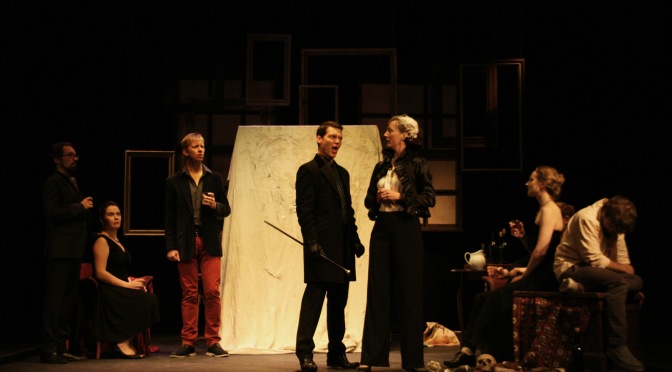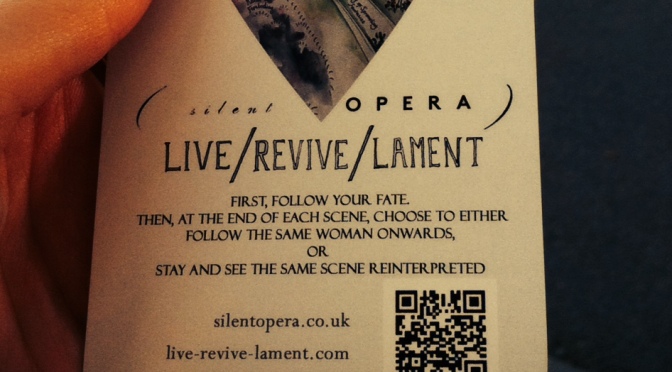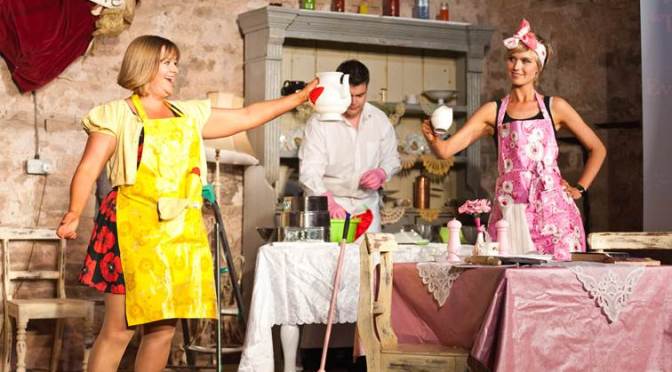Tim Benjamin undoubtedly comes across as a busy and cheerful man, with a get-in and final rehearsals followed by a first night all on a bank holiday Monday. His new opera Madame X has already had some outings up north in his home county of Yorkshire, and now has a three night run as part of the Grimeborn Festival at the Arcola Theatre in Dalston.
We manage to catch up on a late Sunday afternoon and Tim is eager to chat about his latest opera. He states that the preparations have gone well and also expresses how pleased he is so far with the audience’s reactions. This has been determined with feedback forms – the audience seem to have received the dark humour prevalent in the production well, and overall thought the work excellent. Sounds promising. Tim points out that the forms suggest that “over half the audience hadn’t been to see an opera before”, and that they “were likely or very likely to want to go again” after seeing Madame X. He puts a good deal of this down to the clever and tailored multi-media marketing with “lots online, social media” and the trailer “shot like an indie film trailer”. We talk some more about the appeal of opera. Making opera more accessible and available to a wider audience is a subject that Tim speaks passionately and pragmatically on. He points out that this work certainly isn’t deliberately trying to attract everyone, just to add something else in to the mix. “The marketing is doing well and if people like that then [Madame X] will appeal to them.”
The musical language, Tim describes as accessible and “tuneful with a dark touch.” Having a penchant for Baroque music myself, I was very keen to hear more on how Madame X takes inspiration from this style of music. He explains that the “Baroque style is absorbed in to the whole piece, rather than having a modern story plus Baroques music.” The ideas of recitative and aria are loosely present and the structure also takes influence from the Baroque style. Although at approximately 1hr 50mins it’s not the length of many Baroque operas, which probably adds to the works wider appeal. Tonality wise, Tim heads more towards the tonal end of the spectrum, like Shostakovich his music “changes key and is a bit chromatic, but tuneful.” I’m advised to watch out for the Portrait scene, which Tim found very enjoyable to write and he hopes is as fun to watch.
Tim is keen to point out that his singers have great diction making the work easy to follow. The singers were chosen from a mixture of open auditions and previous colleagues. Clearly pleased, he notes that these auditions were massively oversubscribed and there was no shortage of young talent. Auditionees were required to perform a bit of Baroque, a bit in English and, I was glad to hear, to act. Tim continues, “it’s in no way a simplified opera though, it has a simple plot compared to lots of Baroque operas but it asks the audience a lot of questions.”
In addition to composing Madame X, Tim wrote the libretto and has subsequently directed the work. So how did he find it covering all these roles? “Well I know how it goes and the intentions behind it, but I know one person driving can be mono focused, so I do use a dramaturge.” This dramaturge it transpires is also a very good baker, which is a sure fire way of keeping a cast and crew cheerful- an army does march on its stomach! Tim also spoke of how the dramaturge being used to working in the theatre largely with plays and spoken word, was a very good second eye for the drama and staging.
Summer 2013 saw the premier of Tim’s opera Emily, and keen to keep momentum going he began the libretto for Madame X around September 2013. Tim starts with the words, as “the libretto is also the structure”, it’s like looking at the work in the broadest sense. The words of course can be a little flexible, and Tim says that a few changed throughout the composition. The Baroque style influences also came later from the text as the story had a Jacobean revenge drama feel, “it made sense.”
So why write opera? Tim explains that he has a long history with writing music for the stage, and enjoys it. He wrote a musical aged 15, followed by a series of short works and incidental music. He points out that he would of course like to do large scale, big opera house size productions, but doesn’t actually feel limited by smaller forces. Tim says the nine singers in the production make an awesome sound, and to showcase this he chose to have them all singing together close to the end of Madame X. “Plus in a smaller venue it is a particularly massive sound, and is a more intimate experience. An opera singer performing just a foot away from you is very loud.” As for Grimeborn as a festival, Tim likes its different approach from other fringe opera festivals in London. Tête à Tête for example, gives you a chance to see three productions in one night. The downside to this is not immersing yourself in one more complete work. “[Grimeborn at the Arcola] lets you put on a full length more elaborate production, lower risk than somewhere like The Linbury [at the ROH] of course, but a great showcase.”
Tim is considering a tour next year- “if [Madame X] is a hit with public we may as well do it again; it all fits in to a transit van and there’s not too many people to organise. We’ve got everything together now.” Ideally lots of people from the opera business turn up to shows like this, then it could be a spring board. Tim still does a lot himself as mentioned in terms of creative input, but also the organisational side. If Madame X does tour, Tim talks of how he hopes it would do well in Oxford-sized towns, but also that he would definitely like to take it back up north. He says that the opera scene is all too often London focused, with which I myself as a northerner am predisposed and inclined to agree with. Is there enough of a demand in the northern half of England for more opera productions? Could more fringe opera and more funding help fill a space which currently is occupied by little but for that which Opera North offers? Opera North do some wonderful work, but there is only so much one big company can do across such a large area. Arguably, the positive response from Madame X’s premier in Yorkshire and the audience’s subsequent desire to see more opera in the future would suggest there is a need.
After chatting some more in detail about the extent of funding and varying levels of accessibility of the arts across Britain, I say that I’d better let him go for some rest before a hectic day ahead. But no, Tim says he is probably off to the pub. Hopefully I can buy Tim a drink in the Arcola bar after seeing Madame X, and after our conversation I predict this will be a congratulatory drink. I will let you know in a review to follow later this week!
Make sure you try and catch Madame X at The Arcola Theatre as part of the Grimeborn Festival 26th- 28th August 2014.



